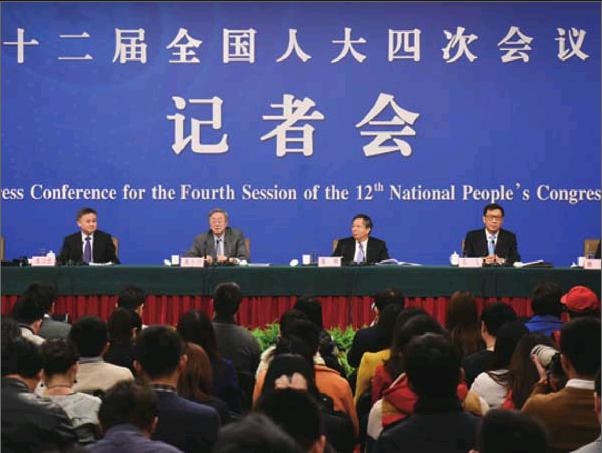REFORMS TAKE SHAPE
2016-03-29ByLanXinzhen
By+Lan+Xinzhen

In his government work report, Premier Li Keqiang vowed to deepen the reform of the financial sector in 2016. It includes efforts to improve the financial regulatory system, further liberalize interest rates and improve the market-based mechanism for setting the yuan exchange rate. It would also affect financial institutions, promote the sound development of the multi-level capital market, as well as harden the crackdown on illegal fundraising. In addition, it would help develop Internet-based, inclusive and green finance. These measures clearly outline Chinas ambition regarding its financial reform policies.
The world is still shaking from the aftershocks of the 2008 global economic crisis that broke out in the United States. The eurozones growth is still anemic, and has been worsened by the refugee crisis. Japan implemented negative interest rates, and the currencies of various emerging economies are weakening due to expectations of a strong dollar. All of these factors intensify uncertainties regarding global and local economic growth prospects.
That is why the international community is closely watching Chinas financial reform policies, and looking to see whether they will affect the countrys economic growth in a positive manner. Should the reform provide favorable results, surely it will be a good indicator for the world economy.
Stable exchange rates
Of all the changes that China could put forward, the market is particularly sensitive to reforms in the exchange rate mechanism.
On August 11, 2015, the Peoples Bank of China (PBOC), the countrys central bank, announced plans to improve the yuans central parity system. In the announcement, the PBOC said that effective from that day, the daily central parity quotes that market makers report to the China Foreign Exchange Trade System before the market opens should be based on a number of factors. The parity quotes should be based on the closing rate of the inter-bank foreign exchange rate market on the previous day, the supply and demand in the market, and exchange rate movement of major currencies.
This measure was designed to satisfy the requirement for the yuan to be included to the currency basket of the International Monetary Funds special drawing rights. This marketbased exchange rate formation mechanism has brought Chinas financial reform to a new stage of development.
The move, however, also caused the yuan to tumble. On August 11, 2015, the yuans central parity rate slid 2 percent against the U.S. dollar, the biggest single-day drop in two decades. After that, the yuan continued depreciating for almost three months.
How will the yuan fare in 2016? Will China let its currency fall further to keep its exports competitive?
Zhou Xiaochuan, Governor of the PBOC, said at a news conference on March 12 that stabilizing the yuans exchange rate is a key focus within the current reforms. In 2015, Chinas trade surplus hit a record high of nearly$600 billion, and Chinas exports accounted for a larger percentage of the worlds total than in previous years. China doesnt need to devalue the yuan to keep its exports competitive against that backdrop.
Zhou claimed that there are multiple reasons for the significant fluctuations in the yuan in previous months. Prominent among those is the downward pressure that the Chinese economy is facing, which has intensified concerns amongst market players. Also, volatility in the countrys stock market made investors nervous, and quantitative easing policies in the European Union and Japan, as well as the interest rate hike by the U.S. Federal Reserve, have further stimulated the devaluation of the yuan.
Nevertheless, the yuan has started to return to a normal and reasonable level, a trend that will continue, according to the governor.
An international yuan
“As the exchange rate market gradually returns to a relatively normal state, the yuans internationalization will keep going forward,” Zhou said.
The panda bonds market has been booming since last year, even while dim sum bonds issued in Hong Kong have declined since the second half of last year due to the yuans volatil- ity. This has given the public more cause for concern about the yuans increasing internationalization.
Zhou said that both panda bonds and dim sum bonds are results of the yuans globalization efforts. Both are bonds denominated in the yuan, though dim sum bonds—named after the popular Hong Kong cuisine—are issued outside of Chinas mainland, and panda bonds are issued onshore by non-Chinese organizations, attracting non-Chinese borrowers. Fluctuations are normal in the financial market, but as panda and dim sum bonds are both price sensitive, once exchange rates change, the onshore and offshore prices of these products will also be affected.
“In the midterm, I personally think panda bonds and dim sum bonds both have a nice future, whether they are in the onshore or offshore bond markets,” said Zhou.
Yi Gang, Vice Governor of the PBOC, said that the yuans internationalization is a marketdriven process, during which corporations and financial institutions are able to develop some financial products in an easier way. Exchange rate fluctuations in previous periods widened the gap between onshore and offshore yuan. As a result, the panda bonds market has been booming while the dim sum bonds market keeps dropping.
“I believe this is temporary. Our policies on the yuans internationalization and supporting the offshore yuan market have not changed,”said Yi. “As the expectations on the exchange rate market turn stable, the yuans internationalization will certainly go further.”
Safer and easier payment
Payment accounts are a new issue that the financial reform must address.
Fan Yifei, Vice Governor of the PBOC, said that China has two types of payment accounts: bank accounts for deposits and payment, and third-party payment accounts to satisfy the demand for electronic payments.
Fan continued that since last year, the central bank has strengthened its classified management of bank accounts and third-party payment accounts, so that the payment system is safer and more convenient. The PBOC requires a strict implementation of a real-name system for accounts to better protect consumers rights and interests.
The central bank will implement a new bank account system starting from April 1 and a new third-party payment account system from July 1. “Our goal is to satisfy the increasingly diversified payment demand of consumers and strike a balance between safety and convenience,” said Fan. “As the supervising authority, we will pay close attention to the responses of the industry and formulate new measures in a timely way, in order to support the sound development of the payment industry and market.”
Stricter financial supervision
Strengthened financial supervision is one of the key aspects of the financial work that will take place in 2016, and was also included in the government work report. This indicates that the Chinese Government attaches great importance to ensuring financial stability and preventing financial risks.
In recent years China has carried out experiments to establish a multi-level financial market, developing Internet-based finance and allowing the establishment of private banks. But in the financial sector, and especially regarding Internetbased finance, problems such as financial fraud and illegal fundraising are frequent occurrences.
To address these problems, the government work report stated that the government will work to ensure that Internet finance develops in line with regulations. It will also tighten institutional constraints, safeguard order in the financial sector, and crack down on financial fraud, illegal fundraising and unlawful and criminal activities in the securities and futures markets.
The report also said that the government will move forward with the reform of the stock and bond markets and increase the rule of law in their development and establish a catastrophe insurance system. The government will also strengthen the unified, macro-prudential management of foreign debt. All these measures aim to carry out financial regulation and control financial risks.
“We also encourage research for the improvement of macro control, macro-prudential policies, financial supervision, protection of financial consumers and financial stability,”Governor Zhou said.
